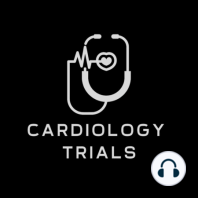30 min listen
Review of the ISIS-4 Trial
ratings:
Length:
16 minutes
Released:
Jan 25, 2024
Format:
Podcast episode
Description
Lancet 1995;345:669-685.Background The premises for ISIS-4 were similar to GISSI-3 with the notable exception of adding an arm to test the effect of magnesium in acute myocardial infarction. Up to this point magnesium was commonly used in patients with acute MI. It was suspected to limit infarct size and reduce arrhythmic events and death; however, it was backed only by animal experiments and small trials in humans that were underpowered to test for realistic differences in mortality. A meta-analysis of such trials was cited in the ISIS-4 manuscript, which reported a 50% relative reduction in mortality! You read that correctly. ISIS-4 was undertaken to test 3 distinct hypotheses: that 1 month of Captopril , 1 month of isosorbide mononitrate, and 24 hours of intravenous magnesium reduced mortality in patients presenting with definite or suspected AMI.Cardiology Trial’s Substack is a reader-supported publication. To receive new posts and support our work, consider becoming a free or paid subscriber.Patients Patients were eligible if they were thought to be within 24 hours of the onset of symptoms of suspected or definite AMI (with or without ECG changes) and if they had no definite contraindications to any of the study treatments. Contraindications were not specified by protocol but by the responsible physician but standard contraindications were suggested like conditions associated with a high risk of adverse events like cardiogenic shock or persistent hypotension (SBP <90-100mmHg) or conditions associated with only a small likelihood of worthwhile benefit, such as a high-risk of death from other life-threatening conditions.Baseline characteristics The majority of patients were men (74%) under the age of 70 years (72%). Eighty percent of patients had ST elevation on their presenting ECG and 40% were within 6 hours from symptom onset. Only 2% of patients had SBP <100 mmHg; however, 14% had clinical heart failure. This represents a departure from the early beta blocker trials which excluded patients with clinical heart failure at study entry.Procedures The study used a 2x2x2 factorial design, resulting in 8 treatment groups:* Captopril, placebo nitrate, control magnesium (C alone)* Captopril, placebo nitrate, magnesium (C + Mg)* Captopril, nitrate, control magnesium (C + N)* Captopril, nitrate, magnesium (C + N + Mg)* Placebo control, placebo nitrate, control magnesium (nil)* Placebo control, placebo nitrate, magnesium (Mg alone)* Placebo control, nitrate, control magnesium (N alone)* Placebo control, nitrate, magnesium (N + Mg)Study treatments were to be started within the first hour of lytic treatment, if lytics were indicated, and immediately otherwise. Patients randomized to captopril received an initial dose of 6.25 mg, 12.5 mg 2 hours later, 25 mg 10-12 hours later and then 50 mg twice daily for 28 days. Those randomized to isosorbide mononitrate received an initial dose of 30 mg, 30 mg 10-12 hours later and then 60 mg each morning for 28 days. Patients randomized to magnesium received 24 hours of intravenous magnesium sulphate with an 8 mmol initial bolus injection over 15 minutes followed by 72 mmol in about 50 ml infused over 24 hours. Placebo captopril and isosorbide mononitrate were utilized but open control was used for magnesium because flushing and other cutaneous signs and symptoms from the initial bolus were thought likely to “unblind” the active treatment.Endpoints The primary endpoint of the trial was intended to be vascular mortality within the first 5 weeks (35 days) but the investigators ended up reporting all-cause mortality since non-vascular mortality was rare and divided evenly between groups and did not impact the main results. A sample size of 40,000 patients was the original aim; however, sufficient treatment was made available for the randomization of up to 60,000. The primary analyses were captopril vs placebo (half of patients in each group received nitrate and magnesium), isosorbide mononitrate vs
Released:
Jan 25, 2024
Format:
Podcast episode
Titles in the series (40)
BHAT and ISIS-I trials by Cardiology Trials
